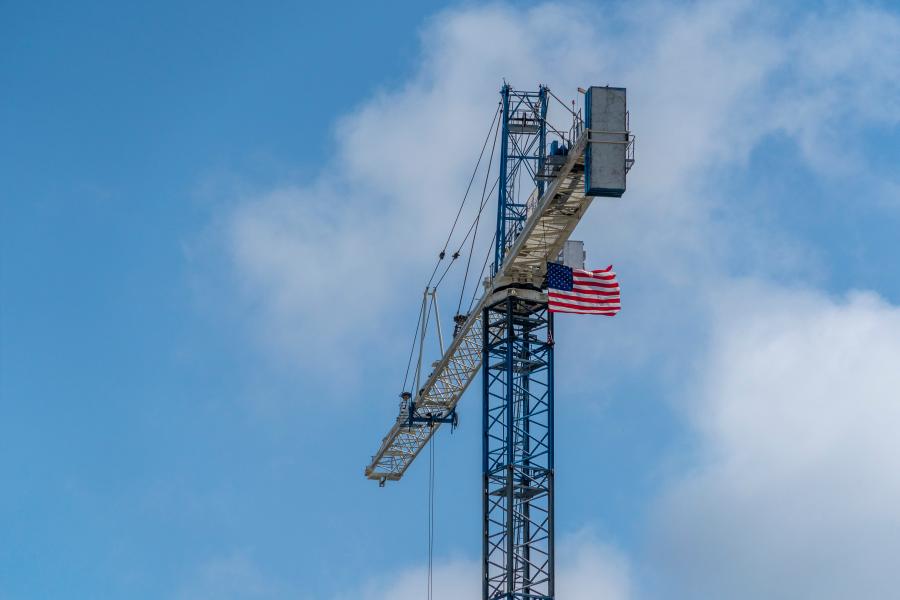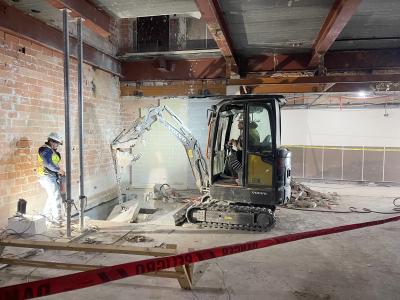BABA supports the Bipartisan Infrastructure Law’s rule that manufactured products, construction materials, iron and steel in federally funded infrastructure projects be made in America.
In mid-August, the White House issued final guidance on the controversial Build America Buy America Act (BABA). President Joe Biden aims to bolster the economy "from the middle down and the bottom up." With some exceptions, the word to the construction industry is to use American-made materials built by American workers.
"It's transforming our country for the better," said Livia Shmavonian, director of the federal Made in America office.
The rules, she said, will reach "communities in every corner of the United States, including those that have too often been left behind."
ARTBA is cautious about the new guidance. In March, the association expressed concerns about several aspects of it. The association felt the BABA implementation process lacks "clarity and logical timing."
A de minimis waver included would exempt smaller projects and a project's first million dollars of funding from Buy America.
The association objected to the policy of not using federal transportation agencies' expertise in administering BABA requirements. ARTBA also was concerned about wording that extended Buy America coverage to "materials beyond or in conflict with Congress' intentions."
While IIJA exempts them from Buy America, OMB's draft guidance suggests these cement, aggregates and binding materials can be covered if combined to make another product.
"ARTBA strongly opposes this potential policy and OMB's proposed expansion of covered materials beyond the five categories Congress specified."
The association noted that for more than 40 years, Buy America has required a domestic manufacturing process for iron, steel and certain manufactured products permanently incorporated into federal-aid highway and transit projects.
In the IIJA, Congress added "construction materials" to that coverage, the association noted in August in notifying its members that the rule had been finalized.
"Most of the policy dialogue on Buy America since the law's enactment 21 months ago has focused on the scope and timing of that new provision," said the group. "ARTBA has submitted comments, initiated meetings and otherwise remained in regular contact with MIAO, DOT and other federal officials as they have developed the directives released this week."
Impact of Guidance
The final guidance supports the Bipartisan Infrastructure Law's (BIL) requirements that manufactured products, construction materials, iron and steel in federally funded infrastructure projects are made in America.
Shmavonian said it also serves as "a guide to agencies in using taxpayer dollars to strengthen our economy."
The act supports the creation of good jobs in both construction and manufacturing expands domestic production through infrastructure investment, she said.
"When President Biden signed the BIL, it represented a once-in-a-generation investment in our nation's infrastructure," said Shmavonian.
The result was a "historic" opportunity to invest in American industry and workers by strengthening Made in America standards. Because the law, which includes the Build America, Buy America Act, expanded standards to require American-made materials and products, taxpayer dollars are invested back in American jobs and manufacturing, she said.
Some 37,000 projects have been funded to date, "and we're seeing the results," said Shmavonian.
"Since the President took office, over 13 million new jobs have been created, including 800,000 new manufacturing jobs nationwide."
She said manufacturing and clean energy have seen more than a half-trillion dollars in outside private investment, already boosting the economy.
"The factory construction of today means manufacturing jobs for tomorrow and, currently, spending on construction of manufacturing plants has nearly doubled in the last two years.
The BIL, the Chips and Science Act, and the Inflation Reduction Act are spurring investments across the country, Shmavonian added. "And thanks to the Build America Buy America Act we're not simply buying those products, we're making them here at home."
Breaking BABA Down
The rule defines key terms and finalizes the test that federal agencies and award recipients must use to determine the cost of components of manufactured products.
The guidance, which becomes effective 60 days after it's published, also sets procedures for requesting and obtaining BABA waivers.
Melissa Taylormoore, a partner of White & Case, said BABA maximizes the fed's use of services, goods, products and materials produced and offered domestically.
"BABA requires three product categories, iron or steel products; manufactured products and construction materials, be produced in the United States when used in covered infrastructure projects," she said.
BABA applies to awards made after May 14, 2022, and used to construct, alter, maintain or repair infrastructure in the United States.
Infrastructure includes public projects, such as roads, highways, bridges, transportation facilities, dams, ports, harbors, railroads, freight and intermodal facilities, airports, water systems and electrical transmission facilities and systems.
"The new guidance is intended to be high-level coordinating guidance for federal agencies to use in their own direct implementation of BABA," said Taylormoore.
She added that the guidance will impact all companies who have or receive BABA covered awards.
As mentioned, there are exceptions to the rule. For instance, for-profit organizations are not subject to Buy American preferences if they are a prime award recipient. Of course, that's unless a federal agency specifically includes domestic content requirements in their award of federal financial assistance.
"Importantly," said Taylormoore, "the Buy America obligations are also applicable to for-profit entities that are a sub-recipient or sub-awardee under an award that contains the Buy America Requirement term and condition."
That also includes for-profit organizations that voluntarily agree to comply with the domestic obligations in their proposal or agreement with the agency.
As Taylormoore explains, the new guidance clarifies that an article, material or supply should only be classified as iron or steel products, manufactured products or construction materials.
"As such, the guidance updates and revises the definitions of these different categories with the objective of providing clear direction for federal agencies and award recipients, thus ensuring compliant projects."
Final Guidance Defined
According to BABA, iron or steel products means articles, materials or supplies that consist "wholly or predominantly" of iron or steel or a combination of both.
"OMB declined to offer a specific definition of what it means by ‘predominantly,' which many commenters to the draft guidance had sought," said Taylormoore.
Instead, BABA's definition aligns generally with the definition used in Federal Acquisition Regulation (FAR) 25.003 and uses the same "predominantly" language.
"OMB believes this symmetry between BABA and the FAR enables a clear differentiation between iron or steel products and other product categories," she added.
At the same time, the two documents simultaneously provide "consistency and predictability between federal procurement projects covered by the FAR and federal financial assistance projects subject to BABA."
Construction materials are defined as articles, materials or supplies that consist of only non-ferrous metals, plastic and polymer-based products, glass, fiber optic cable, optical fiber, lumber, engineered wood and drywall.
"The definition also notes that ‘minor additions of articles, materials, supplies or binding agents to a construction material do not change the categorization of the construction material,' " said Taylormoore.
OMB consulted the list provided by Congress as guidance for the items included as construction materials in determining its final construction materials list.
The agency said items added — fiber optic cable and engineered wood — show that an extension of materials specifically mentioned in the Findings section in BABA also should be treated as construction materials, said Taylormoore.
Certain materials are excluded from the construction materials section, including cement and cementitious materials, aggregates such as stone, sand or gravel and aggregate binding agents or additives.
Manufactured products mean "articles, materials or supplies that have been processed into a specific form and shape or combined with other articles, materials or supplies to create a product with different properties than the individual articles, materials or supplies."
Taylormoore said this document was revised to provide an affirmative definition for the term ‘manufactured products' instead of just explaining what it did not include.
"Importantly, the definition also allows a manufactured product to include components that are construction materials, iron or steel products, or section 70917(c) materials," she said.
She added while materials under BABA cannot fall within more than one of the four categories, the guidance does emphasize that, in some cases, an article, material or supply may not fall under any category.
"Examples of such non-categorized materials would include temporary items brought to a work site and not permanently incorporated into a project, or non-manufactured raw materials that do not meet the definition of ‘manufactured products.'"
The guidance also recaps Buy America's policy on waivers, which the appropriate federal agency must post for public comment and submit to MIAO for review, according to ARTBA.
"Justifications for waivers include ‘unreasonable costs' [i.e. domestic products will increase a project's cost by 25 percent or more], ‘nonavailability' of domestically-manufactured products needed for the project, and ‘public interest.'"
Last November, DOT finalized a waiver ARTBA said it supported. "The final version is somewhat narrower in scope than the original proposal," said ARTBA.
Key provisions include exemption for non-compliant products that total the lesser of $1 million or 5 percent of a project's total applicable costs.
"The latter term represents the total cost of materials and manufactured products subject to Buy America on the project, minus iron and steel," said ARTBA.
Iron and steel are already covered by very small de minimis exemptions, including on federal-aid highway projects.
Exemption for an entire project is allowed when its total federal funding is below $500,000. Previously, almost half of DOT's relevant project awards in 2022 fell under this threshold.
"The department acknowledges the de minimis exemption will save on a project's administrative costs, in part because it may cover much of a project's ‘commercially available off-the-shelf' [COTS] products," said ARTBA.
COTS are difficult to document and certify for Buy America compliance. The association said it has raised COTS concerns for more than a dozen years.
ARTBA told members the association "will continue to oppose any interpretation of BABA which allows for coverage of aggregates and related materials, which we believe conflicts with clear congressional intent."
The group also noted that FHWA is reviewing its longstanding waiver for manufactured products on federal-aid highway projects.
"ARTBA continues to support this important policy, without which the administrative costs for Buy America compliance will likely increase demonstrably." CEG
Lucy Perry
Lucy Perry has 30 years of experience covering the U.S. construction industry. She has served as Editor of paving and lifting magazines, and has created content for many national and international construction trade publications. A native of Baton Rouge, Louisiana, she has a Journalism degree from Louisiana State University, and is an avid fan of all LSU sports. She resides in Kansas City, Missouri, with her husband, who has turned her into a major fan of the NFL Kansas City Chiefs. When she's not chasing after Lucy, their dachshund, Lucy likes to create mixed-media art.
Read more from Lucy Perry here.
Today's top stories

















